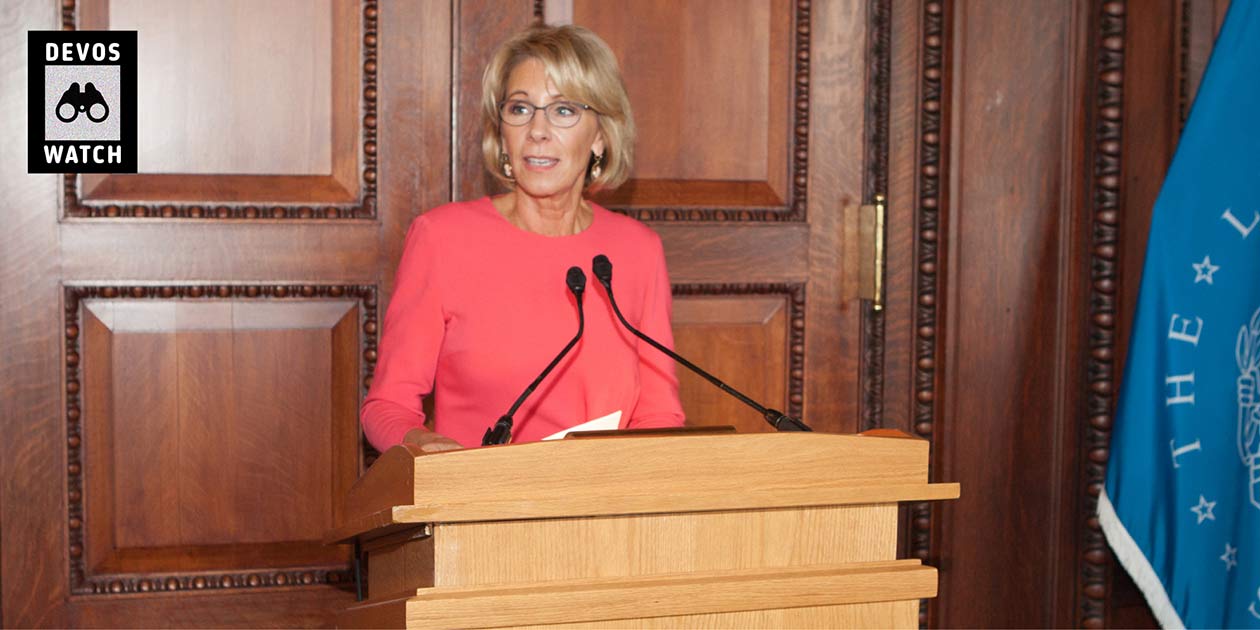In the first of a regular series, we look at Betsy DeVos’s actions as Secretary of State for Education—and we showcase the important developments you need to know.
Campus free speech
The new education secretary used one of her first public addresses, at the Conservative Political Action Conference, to talk about her views on what she sees as growing restrictions on conservative free speech on university campuses—historically liberal hubs.
“The faculty, from adjunct professors to deans, tell you what to do, what to say and, more ominously, what to think,” she said, a week after Milo Yiannopoulous’s canceled Berkeley talk.
“They say that if you voted for Donald Trump, you’re a threat to the university community. But the real threat is silencing the First Amendment rights of people with whom you disagree.”
Sociology professor and author Neil Gross told Inside Higher Ed that the speech in context was aimed at her base. “But coming from an administration that’s said little else about higher ed, it’s worrisome. It suggests they see colleges and universities, and the faculty, as the political enemy—and not much more.”
If U.C. Berkeley does not allow free speech and practices violence on innocent people with a different point of view – NO FEDERAL FUNDS?
— Donald J. Trump (@realDonaldTrump) February 2, 2017
Meanwhile, in Iowa, a bill in the Senate intends to balance the numbers of Republican and Democrat faculty by freezing the recruitment of profs aligned to one party until the other catches up. But the bill’s author, Sen. Mark Chelgren, is facing accusations he misrepresented his own academic credentials.
HBCUs: ‘Choice’ row occludes funding requests
“Historically black colleges and universities (HBCUs) are real pioneers when it comes to school choice,” said Betsy DeVos this week in much-criticized comments that she later clarified on Twitter.
Providing an alternative option to students denied the right to attend a quality school is the legacy of #HBCUs.
— Secretary Betsy DeVos (@BetsyDeVosED) February 28, 2017
But your history was born not out of mere choice, but out of necessity, in the face of racism, and in the aftermath of the Civil War.
— Secretary Betsy DeVos (@BetsyDeVosED) February 28, 2017
Regardless, the executive order signed by President Trump takes responsibility for HBCUs away from DeVos’s department and gives it to the White House. The President’s stated remarks say that the White House will prioritize them because of their historical importance to African Americans. But some have been disappointed by the lack of funding promises in the order.
Walter M. Kimbrough, President of Dillard University in New Orleans, explained that a last-minute change in plan reduced the amount of speaking time allotted to HBCU presidents in front of Trump. Kimbrough intended to ask for an increase in the purchasing power of the Pell Grant, which supports 70 percent of attendees at HBCUs:
“Pell is a great investment especially at HBCUs where new studies indicate we do the best job, as Brookings noted “vaulting lowest-income kids into the top quintile as adults.
“Pell is a vehicle to prevent hallucinations of opportunity, while helping to fuel HBCUs, engines of social and economic mobility driving families toward the American dream.”
A UNCF 10-point plan from December 2016 asks for a meeting between HBCU leaders and the White House, but also asks for the inclusion of HBCUs in a national infrastructure renewal program and a pipeline starting from early-childhood education that will increase African American participation in college.
It remains to be seen whether any of the HBCUs’ requests will be considered.


